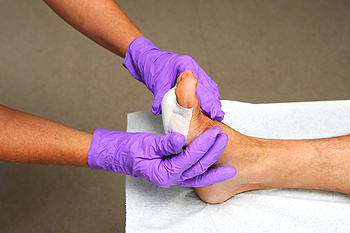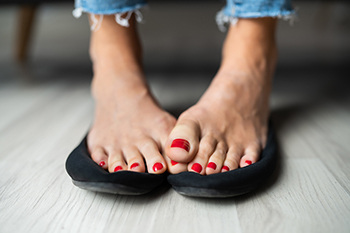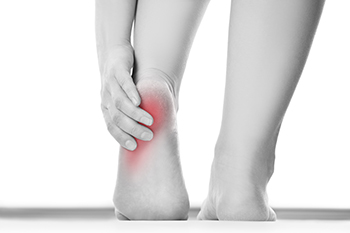Items filtered by date: October 2023
Children’s Toe Wounds

An open wound on the toe involves a disruption in the skin, ranging from a superficial cut to a more serious injury that impacts the deeper structures like tendons, muscles, ligaments, nerves, blood vessels, and bone. For minor wounds, basic first aid is usually sufficient. However, if the toe wound is deep, has a wide opening, or exhibits persistent bleeding, immediate attention by a podiatrist is necessary. In such cases, the podiatrist may use stitches or medical tape to close the wound. It is particularly important to be vigilant about wounds on the toes, as our feet are often exposed to dirt and bacteria, making them more susceptible to infection. Once a child has been treated for a toe wound, it is imperative to adhere strictly to the podiatrist's guidelines to prevent infection and minimize the potential for scarring. If your child has sustained a toe wound and it is more than a minor scrape, it is strongly suggested that you make an appointment with a podiatrist for treatment.
Wound care is an important part in dealing with diabetes. If you have diabetes and a foot wound or would like more information about wound care for diabetics, consult with the foot specialists from Podiatry Associates of Belleville. Our doctors will assess your condition and provide you with quality foot and ankle treatment.
What Is Wound Care?
Wound care is the practice of taking proper care of a wound. This can range from the smallest to the largest of wounds. While everyone can benefit from proper wound care, it is much more important for diabetics. Diabetics often suffer from poor blood circulation which causes wounds to heal much slower than they would in a non-diabetic.
What Is the Importance of Wound Care?
While it may not seem apparent with small ulcers on the foot, for diabetics, any size ulcer can become infected. Diabetics often also suffer from neuropathy, or nerve loss. This means they might not even feel when they have an ulcer on their foot. If the wound becomes severely infected, amputation may be necessary. Therefore, it is of the upmost importance to properly care for any and all foot wounds.
How to Care for Wounds
The best way to care for foot wounds is to prevent them. For diabetics, this means daily inspections of the feet for any signs of abnormalities or ulcers. It is also recommended to see a podiatrist several times a year for a foot inspection. If you do have an ulcer, run the wound under water to clear dirt from the wound; then apply antibiotic ointment to the wound and cover with a bandage. Bandages should be changed daily and keeping pressure off the wound is smart. It is advised to see a podiatrist, who can keep an eye on it.
If you have any questions, please feel free to contact our office located in Belleville, NJ . We offer the newest diagnostic and treatment technologies for all your foot care needs.
Understanding Foot Changes During Pregnancy

Pregnancy is a transformative journey for a woman's body, which extends to her feet as well. As the body adapts to support the growing baby, several changes in the feet can occur. One common alteration is swelling, also known as edema, which is caused by increased blood and fluid volume. This can lead to a noticeable increase in foot size. Hormonal changes, specifically the hormone relaxin, can also affect the ligaments in the feet, potentially causing them to stretch and result in a broader foot shape. Weight gain during pregnancy adds extra pressure to the feet, often leading to fallen arches. These changes can be uncomfortable, but the good news is that they are usually temporary. Once the pregnancy is over, your feet will gradually return to their pre-pregnancy state. In the meantime, wearing comfortable, well-fitting shoes and having regular foot massages can help alleviate some of the discomfort and provide much-needed relief. If you are interested in learning more about how your feet can become affected by pregnancy, it is suggested that you confer with a podiatrist who can offer you useful information.
Pregnant women with swollen feet can be treated with a variety of different methods that are readily available. For more information about other cures for swollen feet during pregnancy, consult with the foot specialists from Podiatry Associates of Belleville. Our doctors will attend to all of your foot and ankle needs.
What Foot Problems Can Arise During Pregnancy?
One problem that can occur is overpronation, which occurs when the arch of the foot flattens and tends to roll inward. This can cause pain and discomfort in your heels while you’re walking or even just standing up, trying to support your baby.
Another problem is edema, or swelling in the extremities. This often affects the feet during pregnancy but tends to occur in the later stages.
How Can I Keep My Feet Healthy During Pregnancy?
- Wearing orthotics can provide extra support for the feet and help distribute weight evenly
- Minimize the amount of time spent walking barefoot
- Wear shoes with good arch support
- Wear shoes that allow for good circulation to the feet
- Elevate feet if you experience swelling
- Massage your feet
- Get regular, light exercise, such as walking, to promote blood circulation to the feet
If you have any questions please feel free to contact our office located in Belleville, NJ . We offer the newest diagnostic and treatment technologies for all your foot and ankle needs.
Excessive Foot Sweat

Excessive foot sweating, known as focal hyperhidrosis, is a common but distressing condition. It involves uncontrollable sweating of the feet even when not hot or physically active. Treatments can help manage its impact. Normal sweating occurs when you are hot, exercising, anxious, or nervous, as the nervous system triggers sweat glands to cool the body. Medical conditions, including diabetes, menopause, thyroid problems, and nervous system disorders, can cause excessive sweating of the feet. Some medications may contribute to this as well. While excessive sweating itself does not harm health, it can significantly affect quality of life, causing emotional distress, skin conditions, and discomfort. Diagnosis involves a medical evaluation to rule out underlying causes. Treatment options can include medications, therapy, and in severe cases, surgery. Moderate relief can consist of keeping the feet clean and dry, wearing moisture-wicking socks made from breathable fabrics, and seeking emotional support if needed. If you suffer from excessively sweaty feet, it is suggested that you make an appointment with a podiatrist for a proper evaluation and treatment.
If you are suffering from hyperhidrosis contact the foot specialists of Podiatry Associates of Belleville. Our doctors can provide the care you need to attend to all of your foot and ankle needs.
Hyperhidrosis of the Feet
Hyperhidrosis is a rare disorder that can cause people to have excessive sweating of their feet. This can usually occur all on its own without rigorous activity involved. People who suffer from hyperhidrosis may also experience sweaty palms.
Although it is said that sweating is a healthy process meant to cool down the body temperature and to maintain a proper internal temperature, hyperhidrosis may prove to be a huge hindrance on a person’s everyday life.
Plantar hyperhidrosis is considered to be the main form of hyperhidrosis. Secondary hyperhidrosis can refer to sweating that occurs in areas other than the feet or hands and armpits. Often this may be a sign of it being related to another medical condition such as menopause, hyperthyroidism and even Parkinson’s disease.
In order to alleviate this condition, it is important to see your doctor so that they may prescribe the necessary medications so that you can begin to live a normal life again. If this is left untreated, it is said that it will persist throughout an individual’s life.
A last resort approach would be surgery, but it is best to speak with your doctor to find out what may be the best treatment for you.
If you have any questions please feel free to contact our office located in Belleville, NJ . We offer the newest diagnostic and treatment technologies for all your foot and ankle needs.
Essential Foot Stretches for Runners

Running can be a fantastic way to stay fit and energized, but it is essential to take care of your feet to prevent injuries and discomfort. Incorporating foot stretches into your routine can help keep your feet in top shape for your runs. One effective stretch is the toe stretch. This is done by sitting with your legs extended and then using your hands to pull your toes back gently, stretching the underside of your foot. After holding for approximately 15 seconds, this can be repeated several times. The calf stretch is also beneficial. Stand facing a wall, with one foot forward and the other extended behind you. Lean into the wall while keeping your back heel on the ground, feeling the stretch in your calf muscle. It is helpful to hold this stretch for 15 seconds on each leg. Lastly, the plantar fascia stretch can relieve tension in the arch of your foot. Sit with one leg crossed over the other, and gently pull your toes back towards you, while holding for 15 seconds on each foot. Regularly incorporating these stretches into your running routine can help improve flexibility and reduce the risk of injuries. A podiatrist can provide you with additional foot stretches that are tailored for runners, and it is suggested that you contact this type of doctor for useful tips.
Stretching the feet is a great way to prevent injuries. If you have any concerns with your feet consult with the foot specialists from Podiatry Associates of Belleville. Our doctors will assess your condition and provide you with quality foot and ankle treatment.
Stretching the Feet
Stretching the muscles in the foot is an important part in any physical activity. Feet that are tight can lead to less flexibility and make you more prone to injury. One of the most common forms of foot pain, plantar fasciitis, can be stretched out to help ease the pain. Stretching can not only ease pain from plantar fasciitis but also prevent it as well. However, it is important to see a podiatrist first if stretching is right for you. Podiatrists can also recommend other ways to stretch your feet. Once you know whether stretching is right for you, here are some excellent stretches you can do.
- Using a foam roller or any cylindrical object (a water bottle or soda can will do), roll the object under your foot back and forth. You should also exert pressure on the object. Be sure to do this to both feet for a minute. Do this exercise three times each.
- Similar to the previous one, take a ball, such as a tennis ball, and roll it under your foot while seated and exert pressure on it.
- Grab a resistance band or towel and take a seat. If you are using a towel, fold it length wise. Next put either one between the ball of your foot and heel and pull with both hands on each side towards you. Hold this for 15 seconds and then switch feet. Do this three times for each foot.
- Finally hold your big toe while crossing one leg over the other. Pull the toe towards you and hold for 15 seconds. Once again do this three times per foot.
It is best to go easy when first stretching your foot and work your way up. If your foot starts hurting, stop exercising and ice and rest the foot. It is advised to then see a podiatrist for help.
If you have any questions, please feel free to contact our office located in Belleville, NJ . We offer the newest diagnostic and treatment technologies for all your foot care needs.
Common Sources of Heel Pain

Heel pain can be a real hindrance, affecting your daily life and mobility. Recognizing symptoms of heel pain helps you identify the cause and find relief. Plantar fasciitis is the most common complaint associated with heel pain. It often causes a sharp pain in the heel, especially in the morning. This condition occurs when the plantar fascia, the tissue connecting your heel bone to your toes, becomes inflamed. Achilles tendinitis results in pain in the back of the heel as the Achilles tendon, which connects the calf muscles to the heel bone, is torn and becomes inflamed. Heel spurs, bony growths on the underside of the heel bone, often accompany conditions like plantar fasciitis and may induce further pain. Bursitis, the inflammation of the bursa sacs around the heel, can lead to pain when walking or wearing tight-fitting shoes. Stress fractures, tiny cracks in the heel bone caused by repetitive stress, result in localized pain. If you're experiencing heel pain, it is suggested that you make an appointment with a podiatrist for an examination and a diagnosis. Then this medically trained foot doctor can formulate a personalized treatment plan to get you back on your feet pain-free.
Many people suffer from bouts of heel pain. For more information, contact the foot specialists of Podiatry Associates of Belleville. Our doctors can provide the care you need to keep you pain-free and on your feet.
Causes of Heel Pain
Heel pain is often associated with plantar fasciitis. The plantar fascia is a band of tissues that extends along the bottom of the foot. A rip or tear in this ligament can cause inflammation of the tissue.
Achilles tendonitis is another cause of heel pain. Inflammation of the Achilles tendon will cause pain from fractures and muscle tearing. Lack of flexibility is also another symptom.
Heel spurs are another cause of pain. When the tissues of the plantar fascia undergo a great deal of stress, it can lead to ligament separation from the heel bone, causing heel spurs.
Why Might Heel Pain Occur?
- Wearing ill-fitting shoes
- Wearing non-supportive shoes
- Weight change
- Excessive running
Treatments
Heel pain should be treated as soon as possible for immediate results. Keeping your feet in a stress-free environment will help. If you suffer from Achilles tendonitis or plantar fasciitis, applying ice will reduce the swelling. Stretching before an exercise like running will help the muscles. Using all these tips will help make heel pain a condition of the past.
If you have any questions please contact our office located in Belleville, NJ . We offer the newest diagnostic and treatment technologies for all your foot and ankle needs.
